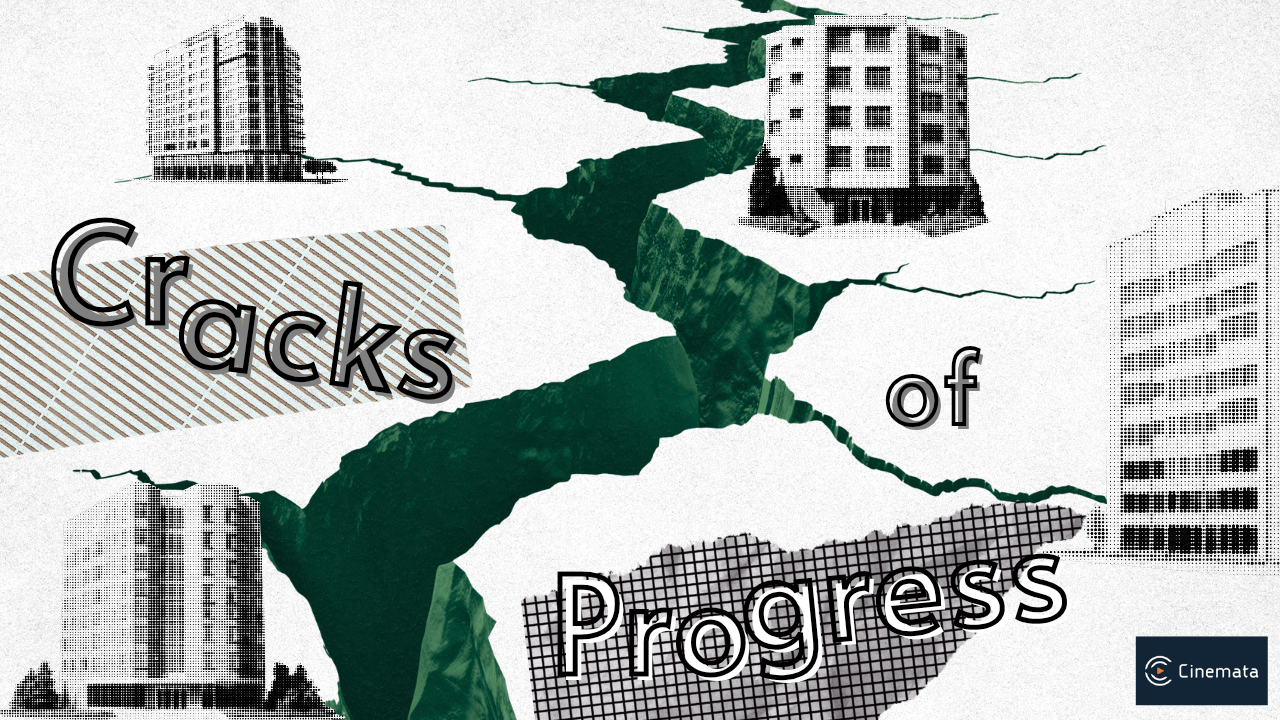The Cracks of Progress

By Eunice Helera | September 30, 2025
Not all that glitters in the name of development is truly progress. Too often, infrastructures and investments arrive with promises of prosperity while uprooting the very people and environments they claim to serve. Behind the language of modernisation lies the displacement of communities, the exhaustion of natural resources, and the erasure of memory. This program, The Cracks of Progress, gathers films that uncover the fractures beneath this rhetoric, where ordinary people confront the hidden costs of so-called growth.
From the Isnag people in Los Mandayas, whose farmlands and ancestral ties to the river face the threat of a looming dam project, we see how entire ways of life can be imperilled in the name of national development. In Batang Pier, children of Manila's harbour dive into polluted waters, their play shadowed by labour and survival—an image that captures both resilience and the stark consequences of neglect. Meanwhile, The Struggle Behind Oil Palm Plantation turns to Indonesia, where former workers recount exploitation, environmental damage, and the long shadows cast by corporate profit.
Equally urgent are the stories of communities at the edge of displacement. Daíng follows fisherfolk whose livelihoods are imperilled by eviction and urban expansion, while Hom Pim Pah! examines the loss of green playgrounds in Yogyakarta, Indonesia, where children's play is steadily consumed by hotel construction and unchecked growth. Mama Mariode becomes a portrait of resistance: Mariode Malak's refusal to sell her land and her efforts to demarcate customary rights as a plantation corporation expands along the banks of the Klasafet River in Indonesia. Each of these films not only documents loss but also insists on the dignity of those resisting invisibility.
What binds these stories together is not merely the record of exploitation, but the persistence of voices that refuse to be silenced. They show us that cracks are not only scars of damage but openings through which protest, memory, and care endure. Across Southeast Asia, where rapid urbanisation and extractive industries dominate the horizon, these films call us to pause and reflect: Who pays the price of progress? Whose futures are bargained away? And what might it mean to build development rooted not in erasure but in justice and community well-being?
Together, the films of The Cracks of Progress remind us that to truly measure progress, we must look beyond skylines, highways, and plantations. We must examine how communities remain intact, how children can grow without fear, and how the land and waters that sustain us are correctly cared for. In doing so, these works urge us to imagine a future where cracks are not deepened by exploitation but mended through solidarity, resistance, and collective healing.
Hom Pim Pah!
Dir. kotakhitam Forum | Indonesia | 2016
Hom Pim Pah!—once a carefree children's game—becomes a haunting echo in Yogyakarta, where green spaces vanish under hotels and skyscrapers. As playgrounds disappear, childhood itself is pushed aside by unchecked development. This film asks: what happens to play, joy, and memory when concrete takes over every corner of the city?
Batang Pier
Dirs. Camille Adraincem, Paola Recuenco and Michelle Saquido | Philippines | 2021
In Manila's Pier 18, children as young as 10 dive into polluted waters, scavenging junk to sell for a few pesos. What should be a place of play becomes a site of labor and risk, where survival means braving infections, disease, and danger—an unflinching glimpse into the harsh realities of poverty by the port.
Daíng (Woes)
Dir. Jan Darryl C. Villafuerte | Philippines | 2023
In Filipino, "daing" not only signifies a method of fish preparation but also encapsulates the essence of "woes." The film focuses on the lives of Isla Pamarawan's fishing community, as they are on the verge of losing their livelihood and are facing displacement due to the threat of rapid urbanisation.
The Struggle Behind Oil Palm Plantation (Pergumulan di Balik Perusahaan Kelapa Sawit)
Dir. Dayak Voices | Indonesia | 2019
Former works of WILMAR BSK recall how promises of prosperity from palm oil plantations in 2010 turned into years of exploitation and loss. Instead of improved welfare, they endured unsafe conditions, the erosion of rights, and the destruction of their environment—revealing how "development" stripped away the harmony they once shared with nature and community.
Mama Mariode (Indonesian)
By Papuan Voices Sorong Raya | Indonesia | 2015
Mariode Malak and Kefas Gisim stand as the last defenders of the Klasafet River forest, resisting a plantation corporation's expansion. While their neighbors sold their land, they refused, staking signposts to claim ancestral rights. For them, the forest is life—an inheritance from their ancestors that must be safeguarded and passed on to generations yet to come.
Los Mandayas
Dir. Jhayzen Parañal | Philippines | 2024
The Isnag people, whose existence revolves around farming near the dam and mountains, find inspiration in their livelihood. They draw strength from the land, cherishing their connection to nature and relying on it for sustenance. Their unwavering spirit and dedication inspire others.